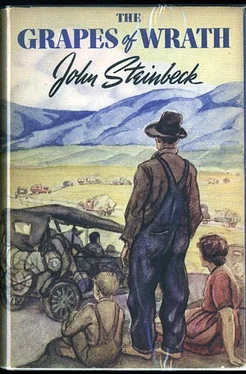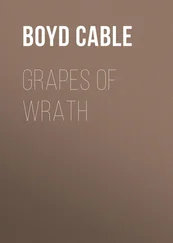John Steinbeck - The Grapes of Wrath
Здесь есть возможность читать онлайн «John Steinbeck - The Grapes of Wrath» весь текст электронной книги совершенно бесплатно (целиком полную версию без сокращений). В некоторых случаях можно слушать аудио, скачать через торрент в формате fb2 и присутствует краткое содержание. Город: New York, Год выпуска: 1939, Издательство: The Viking Press-James Lloyd, Жанр: Классическая проза, на английском языке. Описание произведения, (предисловие) а так же отзывы посетителей доступны на портале библиотеки ЛибКат.
- Название:The Grapes of Wrath
- Автор:
- Издательство:The Viking Press-James Lloyd
- Жанр:
- Год:1939
- Город:New York
- ISBN:нет данных
- Рейтинг книги:5 / 5. Голосов: 1
-
Избранное:Добавить в избранное
- Отзывы:
-
Ваша оценка:
- 100
- 1
- 2
- 3
- 4
- 5
The Grapes of Wrath: краткое содержание, описание и аннотация
Предлагаем к чтению аннотацию, описание, краткое содержание или предисловие (зависит от того, что написал сам автор книги «The Grapes of Wrath»). Если вы не нашли необходимую информацию о книге — напишите в комментариях, мы постараемся отыскать её.
The Grapes of Wrath — читать онлайн бесплатно полную книгу (весь текст) целиком
Ниже представлен текст книги, разбитый по страницам. Система сохранения места последней прочитанной страницы, позволяет с удобством читать онлайн бесплатно книгу «The Grapes of Wrath», без необходимости каждый раз заново искать на чём Вы остановились. Поставьте закладку, и сможете в любой момент перейти на страницу, на которой закончили чтение.
Интервал:
Закладка:
Tom came beside him. “Want I should take her a piece?” he asked.
“I ain’t tired,” said Al.
“Well, you didn’t get no sleep las’ night. I took a snooze this morning. Get up there on top. I’ll take her.”
“Awright,” Al said reluctantly. “But watch the oil gauge pretty close. Take her slow. An’ I been watchin’ for a short. Take a look a the needle now an’ then. ’F she jumps to discharge it’s a short. An’ take her slow, Tom. She’s overloaded.”
Tom laughed. “I’ll watch her,” he said. “You can res’ easy.”
The family piled on top of the truck again. Ma settled herself beside Granma in the seat, and Tom took his place and started the motor. “Sure is loose,” he said, and he put it in gear and pulled away down the highway.
The motor droned along steadily and the sun receded down the sky in front of them. Granma slept steadily, and even Ma dropped her head forward and dozed. Tom pulled his cap over his eyes to shut out the blinding sun.
Paden to Meeker is thirteen miles; Meeker to Harrah is fourteen miles; and then Oklahoma City—the big city. Tom drove straight on. Ma waked up and looked at the streets as they went through the city. And the family, on top of the truck, stared about at the stores, at the big houses, at the office buildings. And then the buildings grew smaller and the stores smaller. The wrecking yards and hot-dog stands, the out-city dance halls.
Ruthie and Winfield saw it all, and it embarrassed them with its bigness and its strangeness, and it frightened them with the fine-clothed people they saw. They did not speak of it to each other. Later—they would, but not now. They saw the oil derricks in the town, on the edge of the town; oil derricks black, and the smell of oil and gas in the air. But they didn’t exclaim. It was so big and so strange it frightened them.
In the street Rose of Sharon saw a man in a light suit. He wore white shoes and a flat straw hat. She touched Connie and indicated the man with her eyes, and then Connie and Rose of Sharon giggled softly to themselves, and the giggles got the best of them. They covered their mouths. And it felt so good that they looked for other people to giggle at. Ruthie and Winfield saw them giggling and it looked such fun that they tried to do it too—but they couldn’t. The giggles wouldn’t come. But Connie and Rose of Sharon were breathless and red with stifling laughter before they could stop. It got so bad that they had only to look at each other to start over again.
The outskirts were wide spread. Tom drove slowly and carefully in the traffic, and then they were on 66—the great western road, and the sun was sinking on the line of the road. The windshield was bright with dust. Tom pulled his cap lower over his eyes, so low that he had to tilt his head back to see out at all. Granma slept on, the sun on her closed eyelids, and the veins on her temples were blue, and the little bright veins on her cheeks were wine-colored, and the old brown marks on her face turned darker.
Tom said, “We stay on this road right straight through.”
Ma had been silent for a long time. “Maybe we better fin’ a place to stop ’fore sunset,” she said. “I got to get some pork a-boilin’ an’ some bread made. That takes time.”
“Sure,” Tom agreed. “We ain’t gonna make this trip in one jump. Might’s well stretch ourselves.”
Oklahoma City to Bethany is fourteen miles.
Tom said, “I think we better stop ’fore the sun goes down. Al got to build that thing on the top. Sun’ll kill the folks up there.”
Ma had been dozing again. Her head jerked upright. “Got to get some supper a-cookin’,” she said. And she said, “Tom, your pa tol’ me about you crossin’ the State line—”
He was a long time answering. “Yeah? What about it, Ma?”
“Well, I’m scairt about it. It’ll make you kinda runnin’ away. Maybe they’ll catch ya.”
Tom held his hand over his eyes to protect himself from the lowering sun. “Don’t you worry,” he said. “I figgered her out. They’s lots a fellas out on parole an’ they’s more goin’ in all the time. If I get caught for anything else out west, well, then they got my pitcher an’ my prints in Washington. They’ll sen’ me back. But if I don’t do no crimes, they won’t give a damn.”
“Well, I’m a-scairt about it. Sometimes you do a crime, an’ you don’t even know it’s bad. Maybe they got crimes in California we don’t even know about. Maybe you gonna do somepin an’ it’s all right, an’ in California it ain’t all right.”
“Be jus’ the same if I wasn’t on parole,” he said. “On’y if I get caught I get a bigger jolt’n other folks. Now you quit a-worryin’,” he said. “We got plenty to worry about ’thout you figgerin’ out things to worry about.”
“I can’t he’p it,” she said. “Minute you cross the line you done a crime.”
“Well, that’s better’n stickin’ aroun’ Sallisaw an’ starvin’ to death,” he said. “We better look out for a place to stop.”
They went through Bethany and out on the other side. In a ditch, where a culvert went under the road, an old touring car was pulled off the highway and a little tent was pitched beside it, and smoke came out of a stove pipe through the tent. Tom pointed ahead. “There’s some folks campin’. Looks like as good a place as we seen.” He slowed his motor and pulled to a stop beside the road. The hood of the old touring car was up, and a middle-aged man stood looking down at the motor. He wore a cheap straw sombrero, a blue shirt, and a black, spotted vest, and his jeans were stiff and shiny with dirt. His face was lean, the deep cheek-lines great furrows down his face so that his cheek bones and chin stood out sharply. He looked up at the Joad truck and his eyes were puzzled and angry.
Tom leaned out of the window. “Any law ’gainst folks stoppin’ here for the night?”
The man had seen only the truck. His eyes focused down on Tom. “I dunno,” he said. “We on’y stopped here ’cause we couldn’t git no further.”
“Any water here?”
The man pointed to a service-station shack about a quarter of a mile ahead. “They’s water there they’ll let ya take a bucket of.” Tom hesitated. “Well, ya s’pose we could camp down ’longside?” The lean man looked puzzled. “We don’t own it,” he said. “We on’y stopped here ’cause this goddamn ol’ trap wouldn’ go no further.” Tom insisted. “Anyways you’re here an’ we ain’t. You got a right to say if you wan’ neighbors or not.”
The appeal to hospitality had an instant effect. The lean face broke into a smile. “Why, sure, come on off the road. Proud to have ya.” And he called, “Sairy, there’s some folks goin’ ta stay with us. Come on out an’ say how d’ya do. Sairy ain’t well,” he added. The tent flaps opened and a wizened woman came out—a face wrinkled as a dried leaf and eyes that seemed to flame in her face, black eyes that seemed to look out of a well of horror. She was small and shuddering. She held herself upright by a tent flap, and the hand holding onto the canvas was a skeleton covered with wrinkled skin.
When she spoke her voice had a beautiful low timbre, soft and modulated, and yet with ringing overtones. “Tell ’em welcome,” she said. “Tell ’em good an’ welcome.”
Tom drove off the road and brought his truck into the field and lined it up with the touring car. And people boiled down from the truck; Ruthie and Winfield too quickly, so that their legs gave way and they shrieked at the pins and needles that ran through their limbs. Ma went quickly to work. She untied the three-gallon bucket from the back of the truck and approached the squealing children. “Now you go git water—right down there. Ask nice. Say, ’Please, kin we git a bucket a water?’ and say, ’Thank you.’ An’ carry it back together helpin’, an’ don’t spill none. An’ if you see stick wood to burn, bring it on.” The children stamped away toward the shack.
Читать дальшеИнтервал:
Закладка:
Похожие книги на «The Grapes of Wrath»
Представляем Вашему вниманию похожие книги на «The Grapes of Wrath» списком для выбора. Мы отобрали схожую по названию и смыслу литературу в надежде предоставить читателям больше вариантов отыскать новые, интересные, ещё непрочитанные произведения.
Обсуждение, отзывы о книге «The Grapes of Wrath» и просто собственные мнения читателей. Оставьте ваши комментарии, напишите, что Вы думаете о произведении, его смысле или главных героях. Укажите что конкретно понравилось, а что нет, и почему Вы так считаете.











